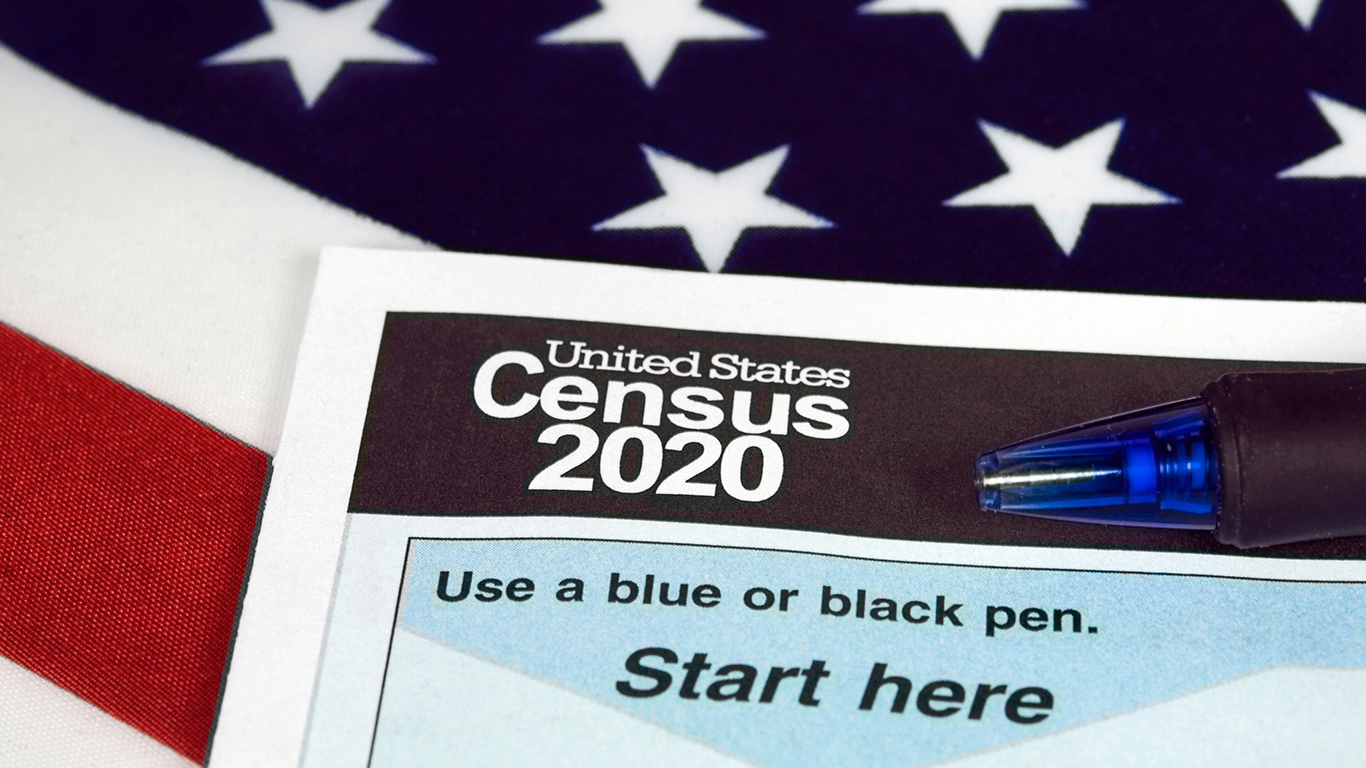

According to the U.S. Constitution, a population count is required every 10 years. The first decennial census was conducted in 1790 and consisted of just six questions. The census has grown in size and complexity since then, and today encompasses demographic, social, and economic information about America’s communities.
As government national surveys become more comprehensive, resistance to the surveys has also increased. For example, the share of households that have declined to participate in the annual census has steadily increased from 0.9% in 2007 to 2.1% in 2016. Many respondents may feel that some questions — concerning grooming habits, marriage history, and snoring tendencies, for example — are unnecessarily probing.
While some respondents may feel uneasy about giving personal information to a surveyor, the Census Bureau and other agencies conducting surveys assert that every question has a purpose and can ultimately help communities in a number of ways. Results of the census help the federal government determine where to distribute more than $675 billion in funds.
Based on the questions asked in several major national surveys, 24/7 Wall St. identified some of the most surprising things the government knows about Americans.
Click here to see the full list of surprising things the government knows about Americans.
Some questions are designed to provide data for assessing health risks on a national scale. The Behavioral Risk Factor Surveillance System, for example, asks respondents whether they have been told that they snore loudly. Rather than cataloging the percentage of Americans who snore, the BRFSS is aiming to generate an estimate of the risk for health problems associated with snoring, such as obstructive sleep apnea.
Additionally, snoring behavior can be difficult to self-assess, and asking respondents whether they have been told they snore may provide a more accurate figure than asking respondents whether they themselves snore or not. While 33.2% of adults report that they never snore, only 23.6% of adults have never been told that they snore.
In some cases, questions include specific qualifiers in order to ensure uniform data collection and reliable statistics. In the BRFSS, for example, respondents are asked to provide their height and weight without shoes in order to collect the raw data needed to calculate body mass index and estimate obesity.
Based on the questions asked in several major national household surveys, 24/7 Wall St. identified some of the most surprising things the government knows about Americans. Surveys used include the American Community Survey and the American Housing Survey of the U.S. Census Bureau, the Behavioral Risk Surveillance System, the Youth Risk Behavior Surveillance System, the National Health and Nutrition Examination Survey of the Centers for Disease Control and Prevention, the American Time Use Survey of the Bureau of Labor Statistics, and American National Election Studies.

1. About how much do you weigh without shoes?
> Survey: Behavioral Risk Factor Surveillance System
The government’s Behavioral Risk Factor Surveillance System surveys over 400,000 people each year, and details like excluding shoes in a weight total can be important in calculating an accurate measure of obesity in America. As of 2016, an estimated 29.9% of adults were obese.
[in-text-ad]

2. About when was your home first built?
> Survey: American Community Survey
The typical U.S. home was built in 1977.

3. At this house, apartment, or mobile home — do you or any member of this household have access to the internet?
> Survey: American Community Survey
An estimated 15.2% of U.S. households did not have internet access as of 2016.

4. Do you consider yourself a feminist?
> Survey: American National Election Studies
The last time the American National Election Survey asked respondents whether they think of themselves as feminists, which was back in 1992, 19.8% responded “yes.”
[in-text-ad-2]

5. Do you have money invested in the stock market?
> Survey: American National Election Studies
Some 40.2% of Americans reported that they had money invested in the stock market in 2012.

6. Do you think the majority of your neighbors are 55 or over?
> Survey: American Housing Survey
Some 21.4% of households with a resident 55 years or older are in neighborhoods in which they believe a majority of residents are also at least 55 years old.
[in-text-ad]

7. Do you have opinions about almost everything, many things, some things, or very few things?
> Survey: American National Election Studies
Some 15.7% of surveyed Americans report having an opinion about almost everything, 38.6% have an opinion about many things, 33.8% have an opinion about some things, and 4.8% have an opinion about very few things.

8. During the past 30 days, how much money did you spend on food carried out or delivered?
> Survey: National Health and Nutrition Examination Survey
The amount of money spent on carryout and food delivery per month by families surveyed by the National Health and Nutrition Examination Survey ranges from nothing to $1,028.

9. During the past 7 days, how many glasses of milk did you drink?
> Survey: Youth Risk Behavior Surveillance System
The National Academy of Sciences recommends that people ages 14 to 18 consume 1,100 milligrams of calcium a day, which is the equivalent of two to three glasses of milk. Currently, an estimated 17.5% of high schoolers drink at least two glasses of milk per day.
[in-text-ad-2]

10. During the past 7 days, how many times did you eat carrots?
> Survey: Youth Risk Behavior Surveillance System
The Youth Risk Behavior Surveillance System monitors health behaviors of high school students. While 72.2% of surveyed high schoolers report drinking soda in the past seven days, only 45.3% report eating carrots.

11. Have you ever been told that you snore loudly?
> Survey: Behavioral Risk Factor Surveillance System
Snoring is an important indicator of sleep disorders, but it can be difficult for respondents to accurately self-assess whether they snore or not. While 33.2% of adults report that they never snore, only 23.6% of adults have never been told that they snore.
[in-text-ad]

12. Have you ever seen signs of mice or rats inside your house/apartment?
> Survey: American Housing Survey
Some 11.2% of households report having seen signs of mice or rats in their homes in the past 12 months.

13. How many times have you been married?
> Survey: American Community Survey
While 3.5% of Americans 15 years old and over have been married at least three times, the majority of U.S. adults have been married just once.

14. On average, how many hours of sleep do you get in a 24-hour period?
> Survey: Behavioral Risk Factor Surveillance System
An estimated 35.2% of American adults get less than seven hours of sleep a night, the amount recommended by the American Academy of Sleep Medicine and Sleep Research Society for health and well-being. Older Americans ages 65 and over get the most sleep, while young adults aged 45 to 54 get the least.
[in-text-ad-2]

15. What time do you usually leave home to go to work?
> Survey: American Community Survey
The busiest time of the day for commuting is between 7:00 a.m. and 7:29 a.m., when 14.6% of commuters leave for work. The least busy time is between 11:00 a.m. and 11:59 a.m., when 1.3% of commuters leave for work.

16. Which fuel is used most for heating this house, apartment, or mobile home?
> Survey: American Community Survey
While some 86.8% of households are heated with either utility gas or electricity, 0.1% use solar energy.
[in-text-ad]

17. Yesterday, how long did you spend grooming yourself?
> Survey: American Time Use Survey
Americans ages 15 years and over spend an average of 41 minutes grooming each day. According to one analysis of American Time Use Survey data, men who spend twice as much time grooming than the average male have slightly higher earnings.
Take This Retirement Quiz To Get Matched With An Advisor Now (Sponsored)
Are you ready for retirement? Planning for retirement can be overwhelming, that’s why it could be a good idea to speak to a fiduciary financial advisor about your goals today.
Start by taking this retirement quiz right here from SmartAsset that will match you with up to 3 financial advisors that serve your area and beyond in 5 minutes. Smart Asset is now matching over 50,000 people a month.
Click here now to get started.
Thank you for reading! Have some feedback for us?
Contact the 24/7 Wall St. editorial team.
 24/7 Wall St.
24/7 Wall St. 24/7 Wall St.
24/7 Wall St.
